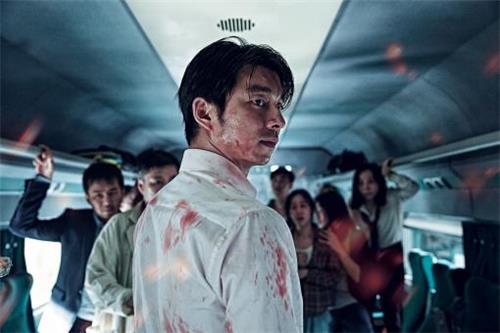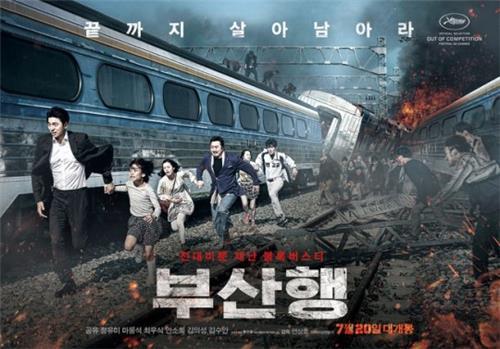- California Assembly OKs highest minimum wage in nation
- S. Korea unveils first graphic cigarette warnings
- US joins with South Korea, Japan in bid to deter North Korea
- LPGA golfer Chun In-gee finally back in action
- S. Korea won’t be top seed in final World Cup qualification round
- US men’s soccer misses 2nd straight Olympics
- US back on track in qualifying with 4-0 win over Guatemala
- High-intensity workout injuries spawn cottage industry
- CDC expands range of Zika mosquitoes into parts of Northeast
- Who knew? ‘The Walking Dead’ is helping families connect
Renowned animator takes zombie genre to next level
SEOUL, July 15 (Yonhap) — Only three years after his animated hit “The King of Pigs,” director Yeon Sang-ho has widened the scope of the zombie genre with his first live-action flick “Train to Busan.”
The triumph of sacrificial love over tyrannical mob mentality has been a frequent theme for many hero movies and disaster films. But the 38-year-old director earned the accolade of “a true Korean-style zombie blockbuster” for the film, thanks to the organic inclusion of social and political messages.
The film’s total production cost amounted to some 8.6 billion won (US$7.5 million), fairly larger than the average budget for a Korean film, yet much less than the extravagant $200 billion spent on “World War Z,” a Hollywood zombie blockbuster starring Brad Pitt and Mireille Enos.
However, the film has left a far heavier weight in the zombie genre.
With an increasing number of South Korea directors showing at global film events — “Train to Busan” was also screened at Cannes Film Festival this year — Yeon is one of the most promising young directors with his fresh take on the universal values of family, using his trademark imagery of justice and society.
Starring actors Gong Yoo, Ma Dong-seok and actress Jung Yu-mi, the 118-minute film portrays society’s fight to survive a fatal virus that turns the infected into bloodthirsty zombies. These gruesome creatures, completely void of humanity, spread the virus with incredible speed and violence and drive the survivors to Busan, the only city that has effectively held off the virus.
A majority of the film takes place on a KTX train. In this enclosed, 300-kilometers-per-hour bullet train, the passengers fight for their lives and to make it to their families, who may or may not have survived the catastrophe.
In a concert of tricks and lies, negotiation, division and betrayal, the number of survivors dwindle every time they pass another train station on their way to Busan.
Seok-woo, played by Gong, is a heartless fund manager who does not care about the loss of the powerless or ordinary people. His love for his daughter is second to none, but he is too busy to take care of her. His one piece of advice to the little girl is that in time of emergencies, you don’t help others.
Gong is no stranger to works with social messages, such as “Silenced,” a film that became crucial in the drive to abolish the prescription period for sex crimes committed against disabled people. Likewise, “Train to Busan,” is expected to cause a major social ripple, as it contains a powerful message about a government’s role in saving its own people in a time of crisis — such a highly contagious fatal virus.
Actor Ma Dong-seok, who plays Sang-hwa, is reflective of “justice that comes from people’s instinct.” An iron-fisted man of robust physique, he loves his pregnant wife more than anything. At first the hot-tempered man fights Seok-woo in every matter, disparaging the fund manager as a cutthroat swindler what exploits innocent people. After the zombie attack, the two men unite under one common goal — protecting their families.
Actress Jung Yu-mi, who plays Sang-hwa’s wife Seong-gyeong, is perhaps the biggest winner of the film, as her stable acting skills met a role that perfectly matches her character. Having been considered by many as an actress mostly undervalued, Jung presented the most irreplaceable Seong-gyeong. A strong woman with love for the weak, Seong-gyeong — one of the most physically feeble characters in the film — survives some of the most excruciating moments for her unborn baby.
Unlike Jung, Ahn So-hee, a former member of K-pop girl group Wonder Girls, was the weakest in the film.
Local critics expressed disappointment in her “distracting acting skills and awkward vocalization.” But the 24-year-old singer-turned-actor, obviously the film’s eye candy, neither excelled nor “marred the highly emotional scenes,” as claimed by some critics. Ahn, who played an high school girl who strives to save her friends and love interest — showed vivid acting in the more romantic scenes. But in the heavier scenes, such as where she strikes back at the selfish crowd who refuse to help other survivors, she falls flat, and is limited in projecting the full development of her character.










![일본 사도광산 [서경덕 교수 제공. 재판매 및 DB 금지]](http://www.koreatimesus.com/wp-content/uploads/2024/07/PYH2024072610800050400_P4-copy-120x134.jpg)


